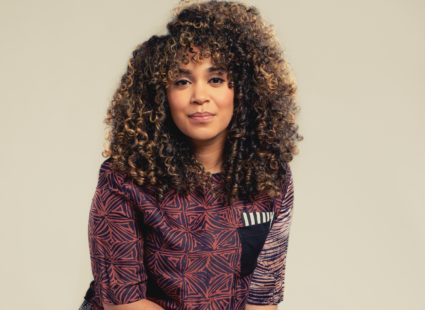
How poetry helped Elizabeth Acevedo know when to stop writing
Our November 2020 pick for Now Read This, the PBS NewsHour's book club with The New York Times, is Elizabeth Acevedo's "The Poet X." Become a member of Now Read This by joining our Facebook group, or by signing up to our newsletter. Learn more about the book club here.
Written in verse, "The Poet X" does not have the typical narrative structure of most young adult novels. It's perhaps fitting, then, that author Elizabeth Acevedo didn't quite know how the book was going to materialize when she first began.
"This wasn't the book I set out to write at all," she said.
It started as "a series of moments," Acevedo told the PBS NewsHour, noting that she might draw inspiration from a conversation with a student (she previously taught eighth grade in Prince George's County, Maryland), or from reading the work of Latina children's book author Meg Medina.
Ultimately "The Poet X" ended up as the story of a Dominican American teenage girl who navigates adolescence with the help of slam poetry. In that sense it closely mirrors Acevedo's own life, as she herself is Dominican American, as well as a slam poet who has won national titles. Acevedo said the practice of "reaching closure in poems" helped her realize when "The Poet X" was finished, as she "could sense when the project had said all I needed to say."
Hear more from Acevedo , including on her routine and favorite childhood books, below.
What is your daily writing routine?
It changes depending on the project, but in general I work to get my heavy lifting done first in the day. And for me that means the blank page drafting. Afternoons are for revisions, emails, musings on something I've read. But mornings I hope I'm still dream hung-over, and some of that will sprinkle onto the writing.
What is your favorite childhood book? Or one book you think everyone should read?
This is hard because so many onf the books I loved as a child I see with very different eyes, but I adored "Charlotte's Web" and "Bridge to Terabithia."
What is something you've seen, watched or read that you think is overlooked and deserves more attention?
Carmen Maria Machado's "In the Dream House" and "The Social Dilemma" on Netflix.
What is the best piece of writer's advice you've received?
I might not be a good writer, but I'm a good reviser. I don't know who said it, or whether I bastardized it, but it's what I repeat to myself when the first draft is kicking my ass.
Can you describe the moment you knew you wanted to write this particular book? And when did you know it was over?
I think "The Poet X" was a series of moments: a conversation with a student, a call from my former teacher and friend, Phil Bildner, reading Meg Medina. And this wasn't the book I set out to write at all. I knew it was over when my critique partners told me to let it go. But I have practiced reaching closure in poems and could sense when the project had said all I needed to say.
Support Canvas
Sustain our coverage of culture, arts and literature.


















